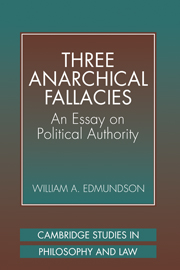Book contents
- Frontmatter
- Contents
- Acknowledgments
- Introduction
- Part One The Fallacious Argument from the Failure of Political Obligation
- Part Two The “Law Is Coercive” Fallacy
- Part Three The Inner Sphere of Privacy Fallacy
- 7 The Private Sphere
- 8 The Moral and the Social
- 9 The Social and the Political
- Conclusion: The State for What?
- Index
7 - The Private Sphere
from Part Three - The Inner Sphere of Privacy Fallacy
Published online by Cambridge University Press: 19 March 2010
- Frontmatter
- Contents
- Acknowledgments
- Introduction
- Part One The Fallacious Argument from the Failure of Political Obligation
- Part Two The “Law Is Coercive” Fallacy
- Part Three The Inner Sphere of Privacy Fallacy
- 7 The Private Sphere
- 8 The Moral and the Social
- 9 The Social and the Political
- Conclusion: The State for What?
- Index
Summary
The relation of law and morality is difficult to define, but it is of great importance. Discussing this relation raises troubling issues such as whether the law may ever require what is morally repugnant, or whether there is any moral requirement to obey the law simply because it is the law. These were the focus of earlier chapters but are separable from the issue I want to explore here, which is whether there may be valid moral requirements that may not validly be made requirements of law. The issue I want to examine is not so much one about what “law” and “morality” mean as it is about turf: Is there (can there be) any department of conduct that morality claims as exclusively its own, and which the law has no business penetrating? The view that there are some moral wrongs that the law may not properly right is tacitly and sometimes explicitly assumed by many participants in the unrelenting debate about the right of privacy.
In what follows I will use the extremely barbarous term “strongly delegalized moral requirements” to refer to the putative class of moral requirements that are forbidden by morality itself to become legal requirements. In this discussion, I will mean by “law” the set of all legal requirements (existing at one place at a time) and by “morality” the set of all valid moral requirements (existing in that place at that time). Legal and moral requirements are distinguishable by the fact that there are state-maintained mechanisms for enforcing the former, but not necessarily the latter, type of requirement.
- Type
- Chapter
- Information
- Three Anarchical FallaciesAn Essay on Political Authority, pp. 127 - 138Publisher: Cambridge University PressPrint publication year: 1998

